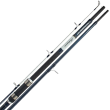Explore Our Premium Sea Fishing Rods and Accessories
Sea fishing rods are essential gear for any angler looking to enjoy the thrill of saltwater fishing. Whether you are shore fishing, surf fishing, or boat fishing, choosing the right sea fishing rod can greatly enhance your experience and improve your chances of a successful catch. Sea rods are specifically designed to withstand the harsh saltwater environment, featuring corrosion-resistant materials, durable guides, and perfectly balanced reel seats to handle bigger fish and rough conditions. Sea fishing rods are generally heavier, more durable, and longer than freshwater fishing rods, making them better suited for the challenges of saltwater fishing.
Our extensive range of sea fishing rods covers everything from lightweight surf rods ideal for casting along the shoreline to powerful boat rods built to tackle the challenges of deep-sea fishing. Beach rods, surf rods, and travel rods are also available to suit various styles and locations. When selecting a rod, consider factors such as rod length, power, action, and the species you are targeting. The power of the rod impacts its ability to catch larger fish and determines how it bends during a fight. Proper rod length and sensitivity help reduce line breaks and improve casting accuracy, making your fishing more enjoyable.
Alongside rods, we offer a wide array of accessories, including reels, rod rests, bite alarms, and tackle bags to complete your fishing setup. Whether you are a beginner or an experienced angler, our selection ensures you can find the best rods and accessories to suit your style and budget.
We regularly monitor prices to ensure that we are offering our sea fishing rods and accessories as competitively as possible. However, if you find an item cheaper elsewhere, please let us know, and we will match it for you.
Sea Fishing Rods FAQs
What is the Difference Between Sea Fishing Rods and Freshwater Fishing Rods?
Sea fishing rods are made with corrosion-resistant materials to withstand saltwater conditions. They are generally more durable and heavier than freshwater rods to handle bigger fish and rougher environments. These rods often feature reinforced guides and reel seats designed to resist salt damage, ensuring longevity and reliable performance even after repeated exposure to harsh marine elements. The main materials for sea fishing rods include graphite, fibreglass, and composite, each offering unique benefits for different fishing styles and preferences.
Additionally, sea fishing rods come in various lengths and power ratings to accommodate different fishing styles and target species, from lightweight surf rods ideal for casting smaller baits to robust boat rods capable of battling large saltwater predators. The enhanced sensitivity of many sea rods allows anglers to detect subtle bites, which is crucial when fishing for species like pollack, bass, or wrasse. Overall, the durability, versatility, and specialised construction of sea fishing rods make them indispensable tools for any angler serious about saltwater fishing.
How Do I Choose the Right Rod Length for Sea Fishing?
Rod length depends on your fishing style. For surf fishing, longer rods (9-12 feet) help cast further into the surf, allowing you to reach fish that are feeding beyond the breaking waves. These longer rods provide the leverage needed to handle bigger fish and manage heavier weights and sinkers used in rough surf conditions.
On the other hand, for boat fishing, shorter rods (6-8 feet) offer better control in tight spaces onboard and allow for quicker, more precise handling of fish in deeper waters. Shorter rods are also easier to manoeuvre when fighting strong, fast fish, making them ideal for inshore and offshore boat fishing. Choosing the right rod length is crucial to match your fishing environment and target species, ensuring optimal casting distance, sensitivity, and overall performance during your sea fishing adventure. Fast action in fishing rods bends near the tip, providing sensitivity and quick hook sets, which can be particularly advantageous in certain fishing scenarios.
What Types of Sea Fishing Rods are Available?
Common types include beach rods (for surf and shore fishing), boat rods (for inshore and offshore fishing), lure rods (for casting artificial baits), jigging rods designed for vertical fishing techniques, and travel rods that prioritise portability and convenience for anglers on the go.
Beach rods are typically longer to allow for powerful casts over the surf, while boat rods are shorter and sturdier to handle the challenges of fishing from a vessel. Lure rods focus on sensitivity and precision to effectively cast and retrieve artificial baits like jigs and soft plastics. Jigging rods are built to withstand the repeated lifting and dropping motions required in jigging, targeting species such as cod and pollack. Travel rods often feature multi-piece or telescopic designs, making them compact and easy to pack without sacrificing performance. Each type of rod is crafted to suit specific fishing styles, conditions, and target species, helping anglers optimise their sea fishing experience.
How Can I Prevent Line Breaks While Sea Fishing?
Use a rod with appropriate power and action for the species targeted. Selecting the right combination of power and action ensures you have enough strength to handle the fish while maintaining the sensitivity needed to detect bites. Ensure your reel seat and guides are made from high-quality, corrosion-resistant materials to withstand the harsh saltwater environment and provide smooth line flow. Avoid sudden jerks or aggressive movements when fighting fish, as these can cause unnecessary stress on the rod and increase the risk of line breaks.
Additionally, properly matching your fishing line strength to the rod’s specifications is crucial; using a line that is too heavy or too light can compromise performance and durability. Regularly inspect your rod and line for signs of wear or damage to maintain optimal fishing efficiency and reduce the chance of gear failure during critical moments.









